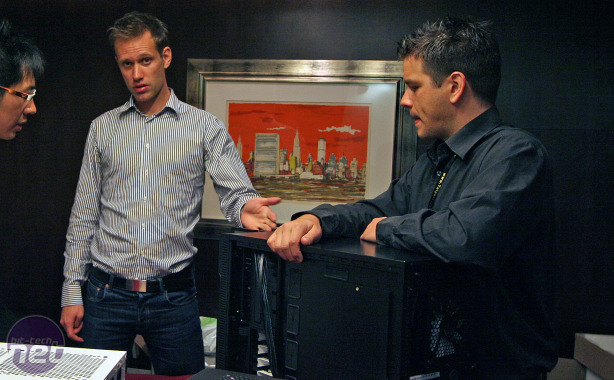
Interview with Fractal Design
We caught up with Fractal Design's head honchos, Hannes Wallin and Tommy Leeman for a face-to-face chat with the team who have turned away from the dominant trend of case designs being high-airflow monsters, looking instead back towards the elegance of clean and simple.Bit-tech: Fractal Design came out of nowhere with the R2, and it received a very positive reaction - how did you guys achieve it?
Fractal Design: We started out in 2008 with case fans and PSUs, then last year we made the R2. We've been in the business for about ten years actually in the distribution business in Sweden, before branching out into making our own products with our own brand. We're both into design and engage with user comments a lot on forums and reviews, so we initially sat back and said to ourselves, what's the case market like, what other products are there, what's missing? We saw there was a gap for this kind of [aesthetically minimalist] case. We did some research and found we could hit the price point we wanted for the features and quality we felt it needed.
We gathered all the good things in the market - the functions people liked, for example the two optical bays and eight 3.5in bays, because people simply have more hard drives. We also liked the minimalist, Scandinavian feeling and felt our design was different to most of the market.
BT: Given the commercial success of the Cooler Master HAF series, did you not feel that it might be a risk to put a comparatively low airflow case onto the market?
FD: We saw that working for Cooler Master, but we also heard many people wanted a clean style case that was silent. There were so few options for them in the market they had to buy all the bits separately - like soundproof matting - and modify it themselves. [The R2's] also fitting for office use, because the style is so clean, which you can't do with a HAF case - we sell a lot of these cases to professional users in CAD or office machines.
BT: Where are your biggest markets at the moment?

The Fractal Design head honchos: Hannes Wallin on the left and Tommy Leeman on the right, discuss their new products with a client.
FD: We started in Europe since we're Swedish - obviously that's our biggest market too with regards to penetration ratio of our products - and there's also UK, Germany and France, which are big markets for us. We're selling to Canada right now and US residents can import from there, but there's no real presence in the US. We're working on that right now to find the right partner. We can't yet say when it'll be exactly; hopefully just a couple of months. The case does surprisingly well in Japan, too - the midi tower and we've got demand for a micro ATX already. We've had Japanese customers tell us they like the Scandinavian design, which is encouraging.
BT: Obviously you've used aluminium in the Array R2 - why have you continued to use steel in the larger cases?
FD: We're not generally fans of aluminium because in terms of noise it's difficult to make it silent. Steel is a stiffer material and easier to make silent cases with. Also it's a price issue - aluminium is expensive and continues to get more so, so this means the Array R2 is double the price [149 Euro] of the Define R2 [80 Euros]. We see everywhere that people don't want to pay for aluminium. They like it, but they don't want to pay the extra cost.

MSI MPG Velox 100R Chassis Review
October 14 2021 | 15:04








Want to comment? Please log in.